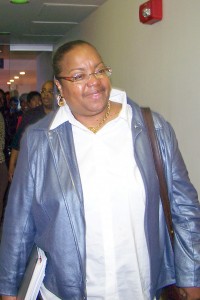BUKOWSKI SENTENCED TO PROBATION, STARTS APPEAL OF FIRST AMENDMENT VIOLATIONS

Wayne County Prosecutor Kym Worthy
The Michigan Citizen
By T. Kelly and staff
DETROIT — Armed with letters of support from citizens and lawyers alike, bolstered by a throng of supporters packing the court, Diane Bukowski’s new attorneys John Royal and Sharon McPhail argued successfully for the Michigan Citizen reporter’s freedom as they mapped preliminary appeal arguments before Judge Michael Hathaway, June 1.
Convicted by a jury last month of two felony counts of resisting and obstructing police, Bukowski faced up to two years in jail. She received one year probation, a $4,000 fine, and 200 hours of community service.
“This is an attack not just on me, but on Black-owned media, and the right of the people of Detroit and other Black majority cities to receive coverage of events crucial to their survival,” said Bukowski after her sentencing. “I have covered trials for years, watching Detroiters railroaded because they cannot afford their own attorneys and because they face mainly suburban white juries who believe the police. Police and state troopers are on the wild because no one, particularly Kym Worthy, checks them.”
Hathaway also said he was “astounded” that Bukowski failed to disclose that one of her two character witnesses at trial, Attorney Jerry Goldberg, was her ex-husband. Calling it an “important piece of information,” Hathaway said it could weigh on credibility. Bukowski said later that the two had not been together for 28 years, and that they maintain professional contact because Bukowski covers stories about events sponsored by organizations like the Moratorium NOW! Coalition against Foreclosures and Evictions, of which Attorney Goldberg is a leader.
Hathaway also said “in fairness,” he had to note that some of the troopers’ testimony was refuted, concluding, “neither side’s hands are clean.” A Fox 2 news videotape of her arrest showed that Bukowski did not resist at all, although troopers testified that she “struggled all the way to the car.” One trooper deleted photos from her camera, felony destruction of evidence, but was never prosecuted.
Bukowski was arrested Nov. 4 while covering a fatal accident scene following a high-speed chase by Michigan State Troopers on East Davison.Those troopers violated numerous vehicle pursuit rules, resulting in the deaths of two Detroiters. They have not been disciplined or charged.
Attorneys Royal and McPhail said the conviction will be appealed and the merits of the issues are “substantial.” While the trial transcript is not yet available, the attorney said there are many appellate issues.
First and foremost are violations of Bukowski’s First Amendment rights during her arrest and at trial. The judge partially granted a motion by the prosecution to preclude testimony relating to Bukowski’s role as a reporter, and did not instruct the jury of her expanded rights at the scene as a new-gather.
Royal said that the preliminary exam transcript showed that 36th District Court Judge Beverly Hayes-Sipes “specifically ruled that the resisting and obstructing statute” did not encompass the crossing of the yellow-tape boundary.
“You are not charged with interfering with the investigation. You are charged with obstructing, assaulting and resisting police officers in the performance of their duties,” the judge ruled. The judge also noted that the prosecutor wanted to charge Bukowski with endangering the officers simply by being on the scene. Hayes-Sipes said that was not “the intent of this particular statute.” She bound Bukowski over on two counts for the two officers who physically came in contact with her during handcuffing.
Royal said the prosecutor also failed to let the defense know of a key witness presented during rebuttal. According to the jury foreman, it was the testimony of that surprise witness, a security guard, that convinced the jury that Bukowski had crossed the yellow tape.
Another basis for appeal stems from the breakdown in the attorney-client relationship between Bukowski and her first attorney. Several weeks before the trial, Attorney Arnold Reed filed a motion to withdraw from defending Bukowski. Both sides agreed that the attorney-client relationship had soured and the prosecutor did not object to Reed’s withdrawal. However, the judge refused to grant the motion for fear the trial date would have to be adjourned. With only 10 days to prepare, Bukowski’s new attorney filed two motions to adjourn the trial to allow more time to prepare. which were deneid.
Royal and McPhail said two attorneys helped in preparing the appeals memorandum, Attorney Kathryn Bruner James, of Goodman and Hurwitz; and Attorney Tim Holloway.
3 Comments
Other Links to this Post
RSS feed for comments on this post. TrackBack URI
By Ron Pauli, June 29, 2009 @ 3:14 pm
This law must be changed. I was charged with R/O
I have seen 10 verbs on my actual ticket and I believe there are 7 verbs listed in the statute.
I am guilty of calling the police names. I thought I was protected under 1st Amendment. Not so. Prosecutors can inflate name calling to this R/O We need a lesser charge Canada has verbal assault misdemeanor.
By C A R, April 9, 2014 @ 4:54 pm
I agree. The police are abusing their powers to victimize and criminalize innocent people. Arrests for assaulting/resisting/obstructing police officers should be outlawed. Everyone should be guaranteed the constitutional right to resist abusive policemen. There is no other way to protect residents of the U.s. from victimization and criminalization by policemen. They have too much power and they abuse it on a regular basis to harm anyone who defies or disagrees with them. Prosecutors, judges and juries who do not protect citizens/residents against policemen are just as guilty of violating the rights of people who are falsely accused of A/R/O police officers. Horrible country. No protection from policemen exists here.
By nike pas cher, October 10, 2015 @ 7:58 am
Villager Alan Whittle, 75, said: “It is ridiculous. Some of us for this road are pensioners, two need walking sticks to get around as well as other